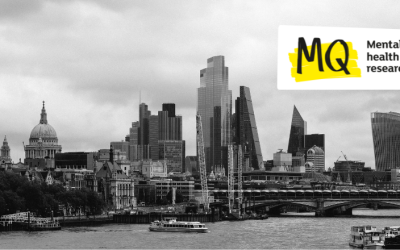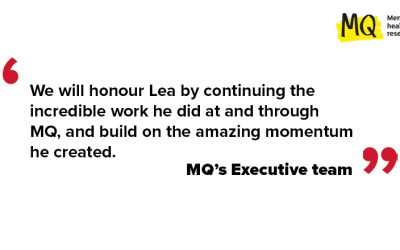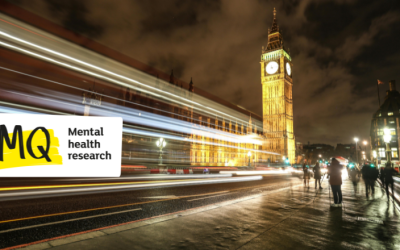Last month saw World Schizophrenia Awareness Day (24 May) and next month marks Schizophrenia Awareness Day (24 July). As we are now between two months which invite conversations around Schizophrenia and related conditions, MQ supporter Giles Addison kindly shared his personal experience of being diagnosed with Schizoaffective Disorder. Giles’ condition is related to but separate as a diagnosis from both Schizophrenia and Bipolar Disorder. Our thanks to Giles for this open and honest contribution.
The vision behind Schizophrenia Awareness Day (24 May 2023) and World Bipolar Day (30 March 2023) is to encourage understanding about what schizophrenia and bipolar disorder is – and isn’t – and to break down the walls of prejudice and stigma.
For me I think of prejudice as the thoughts formed without knowledge, care or reason, and stigma as the actions born from prejudice that mark another.
Prejudice and stigma
Undeniably in recent years there has been a considerable improvement regarding attitudes towards mental health and mental illness. Sadly, as we understand more, we also find ourselves in the most challenging of times. Moving ever deeper into a mental health pandemic we see the care and money that should be invested by government shrinking rather than building.
Despite more openness, much prejudice and stigma still exist. Within my own sphere, most people haven’t seen me at my lowest points and all that those have entailed. I can mask very well, this is a survival necessity developed by many with a mental illness. So, there are many times it has been hinted at or stated outright that I “don’t really have anything wrong” with me, other than a need to “fake having a mental illness” for whatever inexplicable reason that could be. This was especially true in my past work environment, or wider social circles. The fact that I might seem thoroughly competent in all I do can further such doubt.
Fluctuations, Friends and Fear
Let us be clear, mental illness can ebb or flow. Mental illness is rarely constant. Furthermore, I have a daily regime of medications that include mood stabilisers and antipsychotics that help me to retain a more balanced sense of self. Plus, after many years living with bipolar disorder, experiencing the rollercoaster that it is, being in hospitals and crisis houses, participating in therapies, talking with psychiatrists and psychologists, studying books, writing journals, I might just possibly have learnt certain things to help me cope. That doesn’t mean I won’t struggle at times. It just means I don’t necessarily exhibit the confusion and the pain of such internal battles to the outside world. If I did, most of that outside world might find it a rather terrifying odyssey.
That’s in part because a lot of what manifests from mental illness, be it thoughts or actions, rarely makes much sense, so it can be exhausting, troubling or difficult to watch. People are often scared more easily by things they don’t understand, and for many there’s still a fear of mental illness. If I was in an accident and I broke my leg I reckon on most days I’d get a visit in hospital. If I’m in a mental health unit it’s more likely to be, aside from my incredible family, one visitor a week. And in my experience, you don’t lose friends due to a broken leg, but in the other scenario, you might.
Equally there are those who do of course believe your diagnosis, and what a relief and a strength they continually prove to be. However, even though they’re fully aware it’s not something contagious, they may still prefer to keep their distance because they’re not sure what to say or find the environment you’re in – psychiatric hospital - a bit frightening. I can understand that - I certainly have found that environment not pleasant! And I think this can particularly apply if you suffer with psychosis, perhaps borne from hallucinations.
Bipolar Disorder Openness
Following a particularly dark time in my life I decided to be much more open about my journey. I wouldn’t hold back in telling people I had bipolar disorder, and sometimes I’d see a flash across the face that indicated they wanted to exit the scene as quickly as possible. There were times they left so swiftly they had to return moments later to collect whatever they’d forgotten - awkward! However, equally there were many who took it completely in their stride, accepting it calmly and often with an interest to learn.
Most of those people would seem to grasp the idea of being plagued with an unpredictable swing of extreme emotions, that’s quite easy to explain. The more you can expand on what a fall into depression is like, or the unleashed buzz into hypermania/hypomania, the better the chance of improving people’s understanding. I’m known to potentially experience swift and dramatic changes for brief periods, even brief moments.
Other aspects of bipolar, such as obsessive thoughts, anxiety attacks, faltering executive functioning, or how you can be affected physically - these need to be pointed out. Although I’d add that we all have executive functioning and we all can experience a faltering executive functioning, whether diagnosed with bipolar disorder or not. In an ideal world the concept wouldn’t be alien to anyone really. But it is.
Schizoaffective Disorder and Hallucinations
When some years later I received the subsequent diagnosis of schizoaffective disorder, this was not something I so readily revealed, knowing the great increase in stigma it carries. Schizoaffective disorder is bipolar disorder with an added twist - hallucinations. I’m lucky, because I experience all four: olfactory, tactile, visual and auditory; but the most common being that which I hear (or ‘hear’, understand, perceive, sense) the differentiation depending on my lack of good insight at the time.
Eventually I learned to talk about it, and I’ve since observed that there is a pretty much universal reaction when I tell someone I have schizoaffective disorder, one that can be best described as abject horror. I see it in their eyes, and it usually comes as I utter the first syllable. Even if their spoken reaction seems to be accepting, the eyes have already said something quite different. They’re probably already envisioning me with a bloody axe, talking in a multitude of voices or simply laughing in a corner hysterically. I wonder whether inside they’re screaming “Schiz! Did he say schizo? Run for the hills!” The world of film and the media have much to blame for such thinking to be the case. To be clear, I don’t have a multitude of voices, just mine. Well, and Yoda - I do a stellar impression of him. Ok, Miss Piggy too, because they’re both the same man (Frank Oz)!
Dangerous? Me?
I’d faced public stigma before, in places of work and out socially, even in relationships. But when being open about my schizoaffective disorder, it was worse. After all, now I felt seen as unpredictable, even dangerous, violent, and like so many outdated perceptions of those with a mental illness, weak. This made me scary to those less enlightened, or at least an incompetent burden. I’d also be at fault, because the one with the mental illness is often the one to be blamed for it.
Dangerous? Me? I cry at a tissue paper commercial and still believe in dragons and Doctor Who. To do something alarming would be to hug you, with permission that is.
But I internalised this stigma. I isolated myself for a good two years, living as a hermit scared of my own shadow. The lack of social interaction lessened my self-worth and undoubtedly worsened my symptoms. I couldn’t even make basic phone calls and were it not for my big sister I would have been forever lost.
Hope and Pride
Now, I no longer isolate. Goodness no. I’m a card-carrying flag-waving, sometimes even trumpet blowing boy, well, man, when it comes to bipolar/schizoaffective disorder, because I have to be. Yes, as said, I’ve lost friends because of it, found myself excluded, though thankfully I’ve found new friends and am most assuredly included. In addition, I’ve a fantastic family, and an understanding partner. I’m know I’m lucky to have this support.
So let me state to anyone out there, no matter the tumultuous storms you endure there are many lighthouses to guide your way if you look around and crucially learn to trust. And there is hope. I may not have tamed the bipolar or schizoaffective beast, but I can certainly sometimes walk them together, on a leash.
To support further research into the conditions and experiences Giles outlines in this article, please support MQ.



